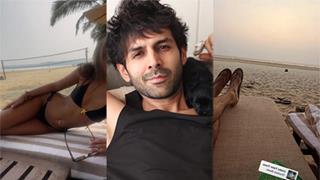/>
I'll be honest. Apart from a few exceptions, I don't think 2007 delivered any outstanding films.
I mean, I really liked Sriram Raghavan's noire film "Johnny Gaddar",
but finally it wasn't that one piece de resistance I was looking for, until the yearend when Sanjay Leela Bhansali's 'Saawariya' wrote poetry on the screen with the calm
controlling measured paces of historical engravings.
Every one was a bit befuddled by the film's bluesy mood and studio-confined romanticism. But as Preity Zinta, who recently saw the film in Toronto and raved, "It takes a
while, but once you get into the pace you're completely sucked in."
I'll have to go with that. I sincerely believe "Saawariya" is destined to be a retro-classic like Guru Dutt's "Kaagaz Ke Phool" and Raj Kapoor's "Mera Naam Joker".
Was it just a coincidence that the "Saawariya" lead reminded people of Waheeda Rehman and Raj Kapoor?
My second favourite film of the year was also slammed by the learned critics of Mumbai. But to me Pradeep Sarkar's "Laaga Chunari Mein Daag" about a simple Varanasi
girl's journey into prostitution in Mumbai was a lyrical and evocative piece of art, echoing Ritwik Ghatak's "Meghe Dhaka Tara" and K. Balachander's neglected "Aaina".
So there! And then comes R. Balkrishnan's "Cheeni Kum". The chemistry between the 60-plus chef Amitabh Bachchan and the 30-plus whatever Tabu was harnessed into a
romantic comedy that lost its fizz in the second-half. Never mind. "Cheeni Kum" is still a modern classic.
Bhavna Talwar's "Dharm" about religious bigotry and atonement in holy Varanasi was a timeless tale told with verve and virility. The key to the film's tantalising tone was the
knack of incorporating a critical social comment in an enormously watchable film.
You may have missed "Dharm" on release. But catch it on a DVD, and re-live a golden chapter of Hindi cinema in 2007.
Golden in its own right was Mira Nair's "The Namesake". Though strictly not desi stuff, it was so Indian at heart it put our contemporary Bollywood tales about hot dames
and cool dudes to shame. Simplicity was never such a prized virtue.
Mira, take a bow.
The two qualities that made Imtiaz Ali's "Jab We Met" so special were the disarming simplicity and the great outdoors. Imtiaz shot this artless love story about a
mismatched couple in the remotest corners of India.
Interestingly, "Saawariya" shot its romance completely inside a studio. Between the two films we have the two
scintillating ends of the same spectrum.
I loved Anurag Basu's "Life In A Metro" and Madhur Bhandarkar's "Traffic Signal" for their ensemble cast of known, unknown and don't-wanna-know.
The portrayal of
life in Mumbai as seen through two totally antithetical perspectives in the two films reminded us that between the elite and the street crowds, there's the world that the
creative artiste could inhabit if he or she wishes.
Shimit Amin's "Chak De! India" was undoubtedly one of the year's most spectacular achievements. Imagine a film on a female hockey team with India's biggest superstar
playing a burnt-out coach? Nah! Not work.
"Chak De! India" didn't just run it, the movie breezed across all competition and assumed a cult status. It set the benchmark for all sports films in India.
The funniest film of the year was... no, not "Bhool Bhulaiyaa" (god forbid!) but another NRI film.
"The Loins Of Punjab Presents" was Manish Acharya's feisty, tasty,
racy look at contestants in a reality show with the show's highlight being Shabana Azmi crooning "Chura liya hai tumne".
Comfortably, the most heart-warming film of 2007 was "Taare Zameen Par" with an immensely satisfying directorial debut by Aamir Khan. That the film came at the end of
the year only added to the feeling that 2008 holds great promise.
The year 2007 came with its baggage of disappointments. The year's biggest letdown was Anil Mehta's directorial debut in "Aaja Nachle". What was Mehta thinking when he
brought Madhuri Dixit back in such a feebly written script and anaemically directed tale?
In comparison, I loved Siddharth Anand's "Ta Ra Rum Pum", which suffered only because the film's concept of poverty entailed the insolvent family moving from Manhattan to
Queen's in New York.
How about from Malabar Hill to Dharavi?
And an honorary mention of debutant director Manoj Tyagi's much-neglected "Mumbai Salsa" about six youngsters scouring Mumbai for love, sex and a self-identity - the
film worked because of its sassy dialogues and situations, energy level, humour and originality.
The newcomers weren't hyped like the girls in "Chak De! India", but were effective because of their nondescript personalities.
As for the outright creative duds of the year, let's not even go there.
I don`t think 2007 delivered any outstanding films
Monday, December 31, 2007 13:35 IST


















